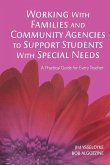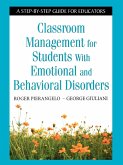Jean Cheng Gorman
Working With Challenging Parents of Students With Special Needs
Jean Cheng Gorman
Working With Challenging Parents of Students With Special Needs
- Broschiertes Buch
- Merkliste
- Auf die Merkliste
- Bewerten Bewerten
- Teilen
- Produkt teilen
- Produkterinnerung
- Produkterinnerung
Move beyond conflict to true collaboration with difficult parents of children with special needs by understanding their perspectives and using appropriate methods to address their concerns!
Andere Kunden interessierten sich auch für
![Working With Parents of Bullies and Victims Working With Parents of Bullies and Victims]() Jr. Walter B. RobertsWorking With Parents of Bullies and Victims33,99 €
Jr. Walter B. RobertsWorking With Parents of Bullies and Victims33,99 €![Involving Parents of Students With Special Needs Involving Parents of Students With Special Needs]() Jill C. DardigInvolving Parents of Students With Special Needs41,99 €
Jill C. DardigInvolving Parents of Students With Special Needs41,99 €![Working With Families and Community Agencies to Support Students With Special Needs Working With Families and Community Agencies to Support Students With Special Needs]() Jim YsseldykeWorking With Families and Community Agencies to Support Students With Special Needs28,99 €
Jim YsseldykeWorking With Families and Community Agencies to Support Students With Special Needs28,99 €![Parents and Professionals Partnering for Children With Disabilities Parents and Professionals Partnering for Children With Disabilities]() Janice M. FialkaParents and Professionals Partnering for Children With Disabilities33,99 €
Janice M. FialkaParents and Professionals Partnering for Children With Disabilities33,99 €![Handbook for Parents of Children with Special Needs Handbook for Parents of Children with Special Needs]() Jayne M WeslerHandbook for Parents of Children with Special Needs16,99 €
Jayne M WeslerHandbook for Parents of Children with Special Needs16,99 €![Classroom Management for Students with Emotional and Behavioral Disorders Classroom Management for Students with Emotional and Behavioral Disorders]() Roger PierangeloClassroom Management for Students with Emotional and Behavioral Disorders33,99 €
Roger PierangeloClassroom Management for Students with Emotional and Behavioral Disorders33,99 €![Effective Assessment for Students with Special Needs Effective Assessment for Students with Special Needs]() James E. YsseldykeEffective Assessment for Students with Special Needs28,99 €
James E. YsseldykeEffective Assessment for Students with Special Needs28,99 €-
-
-
Move beyond conflict to true collaboration with difficult parents of children with special needs by understanding their perspectives and using appropriate methods to address their concerns!
Hinweis: Dieser Artikel kann nur an eine deutsche Lieferadresse ausgeliefert werden.
Hinweis: Dieser Artikel kann nur an eine deutsche Lieferadresse ausgeliefert werden.
Produktdetails
- Produktdetails
- Verlag: Corwin
- Seitenzahl: 194
- Erscheinungstermin: 12. März 2004
- Englisch
- Abmessung: 254mm x 178mm x 11mm
- Gewicht: 376g
- ISBN-13: 9780761939283
- ISBN-10: 0761939288
- Artikelnr.: 20960194
- Herstellerkennzeichnung
- Libri GmbH
- Europaallee 1
- 36244 Bad Hersfeld
- gpsr@libri.de
- Verlag: Corwin
- Seitenzahl: 194
- Erscheinungstermin: 12. März 2004
- Englisch
- Abmessung: 254mm x 178mm x 11mm
- Gewicht: 376g
- ISBN-13: 9780761939283
- ISBN-10: 0761939288
- Artikelnr.: 20960194
- Herstellerkennzeichnung
- Libri GmbH
- Europaallee 1
- 36244 Bad Hersfeld
- gpsr@libri.de
Jean Cheng Gorman, Psy.D., is a licensed psychologist and the author of Emotional Disorders and Learning Disabilities in the Elementary Classroom: Interactions and Interventions (2001, Corwin Press). After teaching in urban and suburban elementary schools, Jean obtained her doctorate in Child and School Psychology at New York University. Her interests in collaborating with parents has included research on Chinese methods of parenting as well as culturally-sensitive parenting programs. Other professional interests include working with children who are medically-fragile and enhancing parent-child relationships in infancy and early childhood. Jean currently lives with her husband and two children in Northern California.
Preface
Acknowledgements
About the Author
Dedication
1. Generating Alliances...not Lawsuits
Gaining Cooperation
Developing Alliances
Being Empathic
Communicating Well
Communicating Poorly
Staying Out of Court
Keeping Your Focus
Reflecting on Your Teaching
Summary
2. Dealing with Anger
Entering The Conflict Stage
Understanding Anger
Being Aware of Cultural Differences in Anger
Dealing with The Openly Angry Parent
Dealing with The Parent Who Is Always Angry
Dealing with The Narcissistic Parent
Ensuring Your Safety
Main Principles for Dealing with Anger
Other Strategies for Dealing with Anger
What to Avoid
Dealing with Anger ... Yours
Going Beyond Anger
Reflecting on Your Teaching
Summary
3. Dealing with Denial
Understanding Denial
Discriminating Between Denial and Defensiveness
Dealing with Differences of Opinions
Knowing When Denial is Harmful (and When It Is Not)
Main Principles for Dealing with Denial
Other Strategies for Dealing with Denial
What to Avoid
Going Beyond Denial
Reflecting on Your Teaching
Summary
4. Dealing with Dissatisfaction
Recognizing the Context of Dissatisfaction
Understanding Dissatisfaction
Responding When Parents Reject the Individual Education Plan (IEP)
Coping with the Consequences of Dissatisfaction
Handling Mediation and Due Process Hearings
Main Principles for Dealing with Dissatisfaction
Other Strategies for Dealing with Dissatisfaction
Working with Advocates
What to Avoid
Going Beyond Dissatisfaction
Reflecting on Your Teaching
Summary
5. Dealing with Nonparticipation and Resistance
Sharing Teachers¿ Views
Discerning Noninvolvement Versus Nonparticipation
Understanding Nonparticipation
Understanding Nonparticipation of Parents of Adolescents
Being Sensitive to Concerns of Culturally and Linguistically Diverse
Parents
Main Principles for Dealing with Nonparticipation and Resistance
Suggestions for Increasing Parent Participation in Transition Planning
Other Strategies for Dealing with Nonparticipation
Other Strategies for Dealing with Resistance
What to Avoid
Going Beyond Nonparticipation and Resistance
Reflecting on Your Teaching
Summary
6. Dealing with Mistrust
Recognizing The Value of Trust
Understanding Mistrust
Acknowledging Other Reasons for Parental Mistrust
Agreeing on an Individual Transition Plan (ITP)
Preventing Mistrust
Main Principles for Dealing with Mistrust
Other Strategies for Dealing with Mistrust
What to Avoid
Going Beyond Mistrust
Reflecting on Your Teaching
Summary
7. Working with Nontraditional Families
Working with Grandparents
Working with Noncustodial Parents
Working with Foster Parents
Working with Homeless Families
Working with Families Where You Suspect Child Abuse or Neglect
Reflecting on Your Teaching
Summary
8. Cultivating Collaborative Relationships
Resolving Your Reservations
Applying Cultural Considerations
Starting at the Beginning
Maintaining the Relationship
Passing the Torch
Promoting a Family-Friendly School
Being Realistic
Reflecting on Your Teaching
Summary
References
Table 1.1 Effective Communication Skills
Table 1.2 Poor Communication Skills
Table 2.1 Safety Tips for Teachers Meeting with Parents
Resource A. Welcome Letter
Resource B. Communication Log
Resource C. Letter to Parents of Older Elementary Students
Resource D. Letter to Parents of Adolescents
Resource E. Parent Observation Sheet
Resource F. Back-to-School Letter
Resource G. Responsibilities of Team Members
Resource H. Intake Conference Letter
Resource I. Conference Summary Sheet
Resource J. Additional Resources
References
Index
Acknowledgements
About the Author
Dedication
1. Generating Alliances...not Lawsuits
Gaining Cooperation
Developing Alliances
Being Empathic
Communicating Well
Communicating Poorly
Staying Out of Court
Keeping Your Focus
Reflecting on Your Teaching
Summary
2. Dealing with Anger
Entering The Conflict Stage
Understanding Anger
Being Aware of Cultural Differences in Anger
Dealing with The Openly Angry Parent
Dealing with The Parent Who Is Always Angry
Dealing with The Narcissistic Parent
Ensuring Your Safety
Main Principles for Dealing with Anger
Other Strategies for Dealing with Anger
What to Avoid
Dealing with Anger ... Yours
Going Beyond Anger
Reflecting on Your Teaching
Summary
3. Dealing with Denial
Understanding Denial
Discriminating Between Denial and Defensiveness
Dealing with Differences of Opinions
Knowing When Denial is Harmful (and When It Is Not)
Main Principles for Dealing with Denial
Other Strategies for Dealing with Denial
What to Avoid
Going Beyond Denial
Reflecting on Your Teaching
Summary
4. Dealing with Dissatisfaction
Recognizing the Context of Dissatisfaction
Understanding Dissatisfaction
Responding When Parents Reject the Individual Education Plan (IEP)
Coping with the Consequences of Dissatisfaction
Handling Mediation and Due Process Hearings
Main Principles for Dealing with Dissatisfaction
Other Strategies for Dealing with Dissatisfaction
Working with Advocates
What to Avoid
Going Beyond Dissatisfaction
Reflecting on Your Teaching
Summary
5. Dealing with Nonparticipation and Resistance
Sharing Teachers¿ Views
Discerning Noninvolvement Versus Nonparticipation
Understanding Nonparticipation
Understanding Nonparticipation of Parents of Adolescents
Being Sensitive to Concerns of Culturally and Linguistically Diverse
Parents
Main Principles for Dealing with Nonparticipation and Resistance
Suggestions for Increasing Parent Participation in Transition Planning
Other Strategies for Dealing with Nonparticipation
Other Strategies for Dealing with Resistance
What to Avoid
Going Beyond Nonparticipation and Resistance
Reflecting on Your Teaching
Summary
6. Dealing with Mistrust
Recognizing The Value of Trust
Understanding Mistrust
Acknowledging Other Reasons for Parental Mistrust
Agreeing on an Individual Transition Plan (ITP)
Preventing Mistrust
Main Principles for Dealing with Mistrust
Other Strategies for Dealing with Mistrust
What to Avoid
Going Beyond Mistrust
Reflecting on Your Teaching
Summary
7. Working with Nontraditional Families
Working with Grandparents
Working with Noncustodial Parents
Working with Foster Parents
Working with Homeless Families
Working with Families Where You Suspect Child Abuse or Neglect
Reflecting on Your Teaching
Summary
8. Cultivating Collaborative Relationships
Resolving Your Reservations
Applying Cultural Considerations
Starting at the Beginning
Maintaining the Relationship
Passing the Torch
Promoting a Family-Friendly School
Being Realistic
Reflecting on Your Teaching
Summary
References
Table 1.1 Effective Communication Skills
Table 1.2 Poor Communication Skills
Table 2.1 Safety Tips for Teachers Meeting with Parents
Resource A. Welcome Letter
Resource B. Communication Log
Resource C. Letter to Parents of Older Elementary Students
Resource D. Letter to Parents of Adolescents
Resource E. Parent Observation Sheet
Resource F. Back-to-School Letter
Resource G. Responsibilities of Team Members
Resource H. Intake Conference Letter
Resource I. Conference Summary Sheet
Resource J. Additional Resources
References
Index
Preface
Acknowledgements
About the Author
Dedication
1. Generating Alliances...not Lawsuits
Gaining Cooperation
Developing Alliances
Being Empathic
Communicating Well
Communicating Poorly
Staying Out of Court
Keeping Your Focus
Reflecting on Your Teaching
Summary
2. Dealing with Anger
Entering The Conflict Stage
Understanding Anger
Being Aware of Cultural Differences in Anger
Dealing with The Openly Angry Parent
Dealing with The Parent Who Is Always Angry
Dealing with The Narcissistic Parent
Ensuring Your Safety
Main Principles for Dealing with Anger
Other Strategies for Dealing with Anger
What to Avoid
Dealing with Anger ... Yours
Going Beyond Anger
Reflecting on Your Teaching
Summary
3. Dealing with Denial
Understanding Denial
Discriminating Between Denial and Defensiveness
Dealing with Differences of Opinions
Knowing When Denial is Harmful (and When It Is Not)
Main Principles for Dealing with Denial
Other Strategies for Dealing with Denial
What to Avoid
Going Beyond Denial
Reflecting on Your Teaching
Summary
4. Dealing with Dissatisfaction
Recognizing the Context of Dissatisfaction
Understanding Dissatisfaction
Responding When Parents Reject the Individual Education Plan (IEP)
Coping with the Consequences of Dissatisfaction
Handling Mediation and Due Process Hearings
Main Principles for Dealing with Dissatisfaction
Other Strategies for Dealing with Dissatisfaction
Working with Advocates
What to Avoid
Going Beyond Dissatisfaction
Reflecting on Your Teaching
Summary
5. Dealing with Nonparticipation and Resistance
Sharing Teachers¿ Views
Discerning Noninvolvement Versus Nonparticipation
Understanding Nonparticipation
Understanding Nonparticipation of Parents of Adolescents
Being Sensitive to Concerns of Culturally and Linguistically Diverse
Parents
Main Principles for Dealing with Nonparticipation and Resistance
Suggestions for Increasing Parent Participation in Transition Planning
Other Strategies for Dealing with Nonparticipation
Other Strategies for Dealing with Resistance
What to Avoid
Going Beyond Nonparticipation and Resistance
Reflecting on Your Teaching
Summary
6. Dealing with Mistrust
Recognizing The Value of Trust
Understanding Mistrust
Acknowledging Other Reasons for Parental Mistrust
Agreeing on an Individual Transition Plan (ITP)
Preventing Mistrust
Main Principles for Dealing with Mistrust
Other Strategies for Dealing with Mistrust
What to Avoid
Going Beyond Mistrust
Reflecting on Your Teaching
Summary
7. Working with Nontraditional Families
Working with Grandparents
Working with Noncustodial Parents
Working with Foster Parents
Working with Homeless Families
Working with Families Where You Suspect Child Abuse or Neglect
Reflecting on Your Teaching
Summary
8. Cultivating Collaborative Relationships
Resolving Your Reservations
Applying Cultural Considerations
Starting at the Beginning
Maintaining the Relationship
Passing the Torch
Promoting a Family-Friendly School
Being Realistic
Reflecting on Your Teaching
Summary
References
Table 1.1 Effective Communication Skills
Table 1.2 Poor Communication Skills
Table 2.1 Safety Tips for Teachers Meeting with Parents
Resource A. Welcome Letter
Resource B. Communication Log
Resource C. Letter to Parents of Older Elementary Students
Resource D. Letter to Parents of Adolescents
Resource E. Parent Observation Sheet
Resource F. Back-to-School Letter
Resource G. Responsibilities of Team Members
Resource H. Intake Conference Letter
Resource I. Conference Summary Sheet
Resource J. Additional Resources
References
Index
Acknowledgements
About the Author
Dedication
1. Generating Alliances...not Lawsuits
Gaining Cooperation
Developing Alliances
Being Empathic
Communicating Well
Communicating Poorly
Staying Out of Court
Keeping Your Focus
Reflecting on Your Teaching
Summary
2. Dealing with Anger
Entering The Conflict Stage
Understanding Anger
Being Aware of Cultural Differences in Anger
Dealing with The Openly Angry Parent
Dealing with The Parent Who Is Always Angry
Dealing with The Narcissistic Parent
Ensuring Your Safety
Main Principles for Dealing with Anger
Other Strategies for Dealing with Anger
What to Avoid
Dealing with Anger ... Yours
Going Beyond Anger
Reflecting on Your Teaching
Summary
3. Dealing with Denial
Understanding Denial
Discriminating Between Denial and Defensiveness
Dealing with Differences of Opinions
Knowing When Denial is Harmful (and When It Is Not)
Main Principles for Dealing with Denial
Other Strategies for Dealing with Denial
What to Avoid
Going Beyond Denial
Reflecting on Your Teaching
Summary
4. Dealing with Dissatisfaction
Recognizing the Context of Dissatisfaction
Understanding Dissatisfaction
Responding When Parents Reject the Individual Education Plan (IEP)
Coping with the Consequences of Dissatisfaction
Handling Mediation and Due Process Hearings
Main Principles for Dealing with Dissatisfaction
Other Strategies for Dealing with Dissatisfaction
Working with Advocates
What to Avoid
Going Beyond Dissatisfaction
Reflecting on Your Teaching
Summary
5. Dealing with Nonparticipation and Resistance
Sharing Teachers¿ Views
Discerning Noninvolvement Versus Nonparticipation
Understanding Nonparticipation
Understanding Nonparticipation of Parents of Adolescents
Being Sensitive to Concerns of Culturally and Linguistically Diverse
Parents
Main Principles for Dealing with Nonparticipation and Resistance
Suggestions for Increasing Parent Participation in Transition Planning
Other Strategies for Dealing with Nonparticipation
Other Strategies for Dealing with Resistance
What to Avoid
Going Beyond Nonparticipation and Resistance
Reflecting on Your Teaching
Summary
6. Dealing with Mistrust
Recognizing The Value of Trust
Understanding Mistrust
Acknowledging Other Reasons for Parental Mistrust
Agreeing on an Individual Transition Plan (ITP)
Preventing Mistrust
Main Principles for Dealing with Mistrust
Other Strategies for Dealing with Mistrust
What to Avoid
Going Beyond Mistrust
Reflecting on Your Teaching
Summary
7. Working with Nontraditional Families
Working with Grandparents
Working with Noncustodial Parents
Working with Foster Parents
Working with Homeless Families
Working with Families Where You Suspect Child Abuse or Neglect
Reflecting on Your Teaching
Summary
8. Cultivating Collaborative Relationships
Resolving Your Reservations
Applying Cultural Considerations
Starting at the Beginning
Maintaining the Relationship
Passing the Torch
Promoting a Family-Friendly School
Being Realistic
Reflecting on Your Teaching
Summary
References
Table 1.1 Effective Communication Skills
Table 1.2 Poor Communication Skills
Table 2.1 Safety Tips for Teachers Meeting with Parents
Resource A. Welcome Letter
Resource B. Communication Log
Resource C. Letter to Parents of Older Elementary Students
Resource D. Letter to Parents of Adolescents
Resource E. Parent Observation Sheet
Resource F. Back-to-School Letter
Resource G. Responsibilities of Team Members
Resource H. Intake Conference Letter
Resource I. Conference Summary Sheet
Resource J. Additional Resources
References
Index








